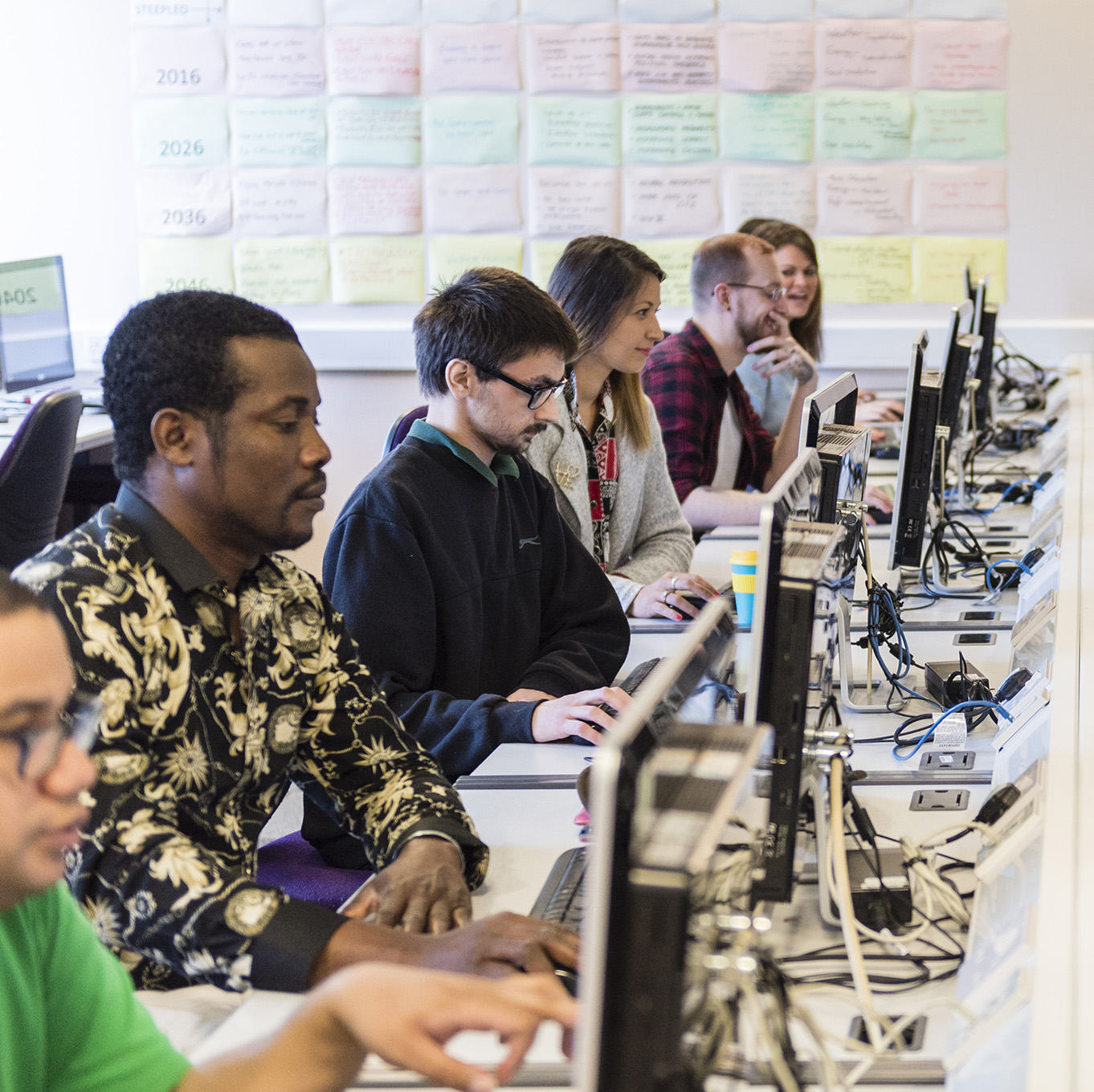BSc (Hons) Software Engineering

Course details
UCAS Code
SE24
Year of entry
2024
Duration
3 years (FT) / 6 years (PT)
Institution Code
G53
Location
Wrexham
Course Highlights
Research active
department in future and emerging technologies
Access
to a wide range of hardware and software
Opportunity
to participate in and quality for CISCO accreditation
Why choose? this course?
Be choosing to study our Software Engineering degree, you will gain the skills ready for work in an industry that is experiencing rapid growth and demand. You will be prepared for work in a variety of sectors including but not limited to, business and economics, healthcare, industry and communications.
You will:
- Benefit from an inclusive and friendly environment
- Be allocated a personal tutor to support you throughout your journey
- Have the opportunity to undertake placements.
- Benefit from guest speakers due to strong industrial links that support the degree.
You can also choose to study this course with foundation year, UCAS code: - or an industrial placement year, UCAS code:

Computing atWrexham University
Thinking of a career in Computing? Hear from lecturers and students about our Computing course at Wrexham University.
Key course features
- You will have the opportunity to complete an industrial placement, providing you with first-hand experience within the workplace.
- This degree will provide an opportunity to participate in the CISCO Academy Programmes and qualify for CISCO accreditation.
- This course responds to identified skills gaps, providing you with the critical understanding, knowledge and skills needed for successful employment.
- Personal development planning is integrated throughout the course to develop the skills framework necessary for effective personal, academic and career management.
What you will study
YEAR 1 (LEVEL 4)
Level 4 contains essential fundamental material which is relevant in all of our computing programmes. You will learn both subject-specific skills along with transferable skills which will increase your employability prospects.
With the support of your tutors, you will learn about some of the essential facts, concepts, principles and theories relating to computing and computer applications. You will be able to demonstrate skills that underpin good practice in the field of computers and computational methods, e.g. laboratory tasks involving the creation of simple programs and the use of operating systems.
This will help develop your understanding of hardware issues, including interfacing and data communications, and their impact on the overall design and performance of computer-based systems.
Modules
- Database Systems
- Software Development Methodologies
- Information Security and Governance
- Quantitated Methods
- Programming Fundamentals
- Computer Systems and Architecture
YEAR 2 (LEVEL 5)
Level 5 continues teaching you the fundamentals of the discipline, and more specialist modules start to be introduced. You will also undertake a group project where you will gain important skills in project management techniques and the professional and ethical issues of project management.
You will also deepen your knowledge and understanding of computing concepts and approaches for complex problems through the application of several existing artificial intelligence techniques for learning and optimisation targeting real-world problems.
Modules
- User Experience Design
- Full-Stack Development
- Secure Software Development
- Systems Engineering and Project Management
- Cloud, Distributed Architecture and Security
- Group Project
YEAR 3 (LEVEL 6)
Once you reach your final year, you will further develop your skills through taught modules and research, with a focus on the latest developments in your chosen discipline.
You will also undertake an individual final year project, which will help prepare you for the kind of tasks and situations you may encounter in the workplace. The final year practical and project work will further develop your analytical skills through the analysis and appraisal of current and emerging technologies, taking into account their impact on society.
Modules
- DevOps
- Data Analysis and Visualisation
- Defensive Security
- Emergent Technologies
- Project
There is an option to start the programme at Foundation Level, while some students may benefit from the experience gained from an additional, but optional industrial placement year.
The information listed in this section is an overview of the academic content of the programme that will take the form of either core or option modules. Modules are designated as core or option in accordance with professional body requirements and internal academic framework review, so may be subject to change.
Entry requirements & applying
The academic requirements for the course are 80-112 UCAS tariff points at GCE A-level or equivalent, including IT, computing, maths or physics.
Applicants who do not meet the criteria above will be assessed on an individual basis by interview.
Teaching & Assessment
Teaching
The computing programme suite utilises a variety of industry standard tools and software in combination with a number of teaching methods designed to deliver industry relevant skills and empower students to take their work further where applicable. All Staff members have embraced the active learning framework (ALF) and there have been a number of enhancements to teaching and learning.
Assessment
The programme team take a balanced approach to assessment strategy with respect to group work and individual development opportunities. Extensive use of the JIRA project management cloud platform is used to track student progress towards goals and milestones. This has proven to be a beneficial tool with respect to personal development and critical time management skills.
Where applicable, assessments are linked to real-world projects or based on current industry trends and issues. In addition, project modules serve as a platform for enterprise activities. At postgraduate level, assessments are research focused and students are encouraged to experiment with the latest technologies and software whilst embedding best research practice.
Personalised Support
The Computing department at WGU the university employs a long-standing open-door policy, and activate engage with students, alumni and industry using our online Discord community. Additional tools such as Teams and Moodle provide core information and methods of contact. All students are also allocated a personal tutor who are encouraged to meet on a regular basis and extra personalised support is provided for all part time students on VLE.
Career prospects
On successful completion of the degree, graduates can gain employment in jobs such as, but not limited to:
- UX designer
- Software engineer
- System engineer
- Project manager
- Verification and validation engineer
- Full stack software engineer
- Database Administrator
Our Careers & Employability service is there to help you make decisions and plan the next steps towards a bright future. From finding work or further study to working out your interests, skills and aspirations, they can provide you with the expert information, advice and guidance you need.
Fees & funding
You do not have to pay your tuition fees upfront.
The fees you pay and the support available will depend on a number of different factors. Full information can be found on our fees & finance pages. You will also find information about what your fees include in the fee FAQs.
All fees are subject to any changes in government policy, view our undergraduate fees.
Programme specification
Accommodation
If you’re looking for a place to stay while you study then take a look at our accommodation pages to get more information on your options, including our on-campus halls of residence Wrexham Village.
International
If you are applying as an European / International Student, and live outside of the UK, you should make your application through our online application system, Centurus.
For information about the university’s entry requirements for EU/international students, please visit our international section.


